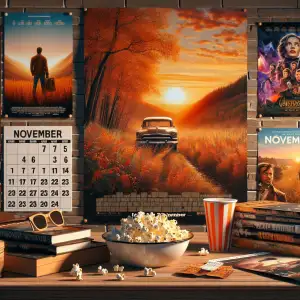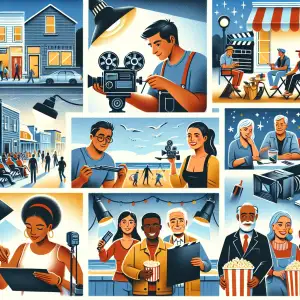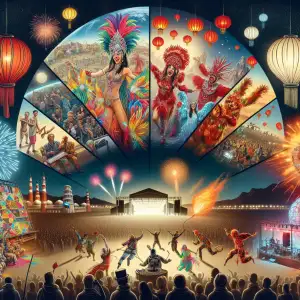70s Movies That Still Got It: Our Picks for the Best of the Decade

The 1970s marked a turning point in cinematic history, an era where groundbreaking special effects met raw, character-driven storytelling. This decade ushered in a new wave of directors like Steven Spielberg, George Lucas, and Francis Ford Coppola, who redefined genres and captivated audiences worldwide. From the gritty streets of New York City in "Taxi Driver" to the vastness of space in "Star Wars," 70s movies reflected a world grappling with social change, political upheaval, and a newfound sense of cinematic possibility. This era gifted us with iconic characters like Michael Corleone, Rocky Balboa, and Ellen Ripley, whose stories continue to resonate with audiences today. Join us as we revisit the best movies from the 1970s, exploring the themes, innovations, and enduring legacies that cemented this decade as a golden age of cinema.
The Godfather (1972)
Francis Ford Coppola's masterpiece, released in 1972, transcends the gangster genre to deliver a timeless epic about family, loyalty, and the corrupting nature of power. "The Godfather" is not just a cornerstone of 70s cinema, it's a cinematic achievement that continues to captivate audiences. Marlon Brando's portrayal of Don Vito Corleone, the aging patriarch of a powerful Mafia family, is iconic, while Al Pacino delivers a star-making performance as Michael, the reluctant son who transforms into a ruthless mob boss. The film's brilliance lies in its complex characters, gripping narrative, and stunning visuals. The cinematography by Gordon Willis, with its use of shadows and light, creates a world both alluring and dangerous. The haunting score by Nino Rota perfectly complements the film's operatic themes. "The Godfather" is a cinematic triumph that set a new standard for filmmaking in the 1970s and beyond. Its influence can still be felt in countless films and TV shows today. It's a must-see for any film enthusiast and a testament to the power of great storytelling.
| Movie Title | Director | Genre | Year Released |
|---|---|---|---|
| Star Wars: A New Hope | George Lucas | Science Fiction | 1977 |
| Jaws | Steven Spielberg | Thriller | 1975 |
| The Godfather | Francis Ford Coppola | Crime Drama | 1972 |
Jaws (1975)
No one forgets the first time they saw Jaws. The image of the dorsal fin slicing through the water, John Williams' iconic score, and the palpable terror instilled by Spielberg's masterful direction make it more than a monster movie - it's a cinematic phenomenon. Released in 1975, Jaws set a new standard for thrillers, becoming a massive box office success and changing the landscape of Hollywood forever.
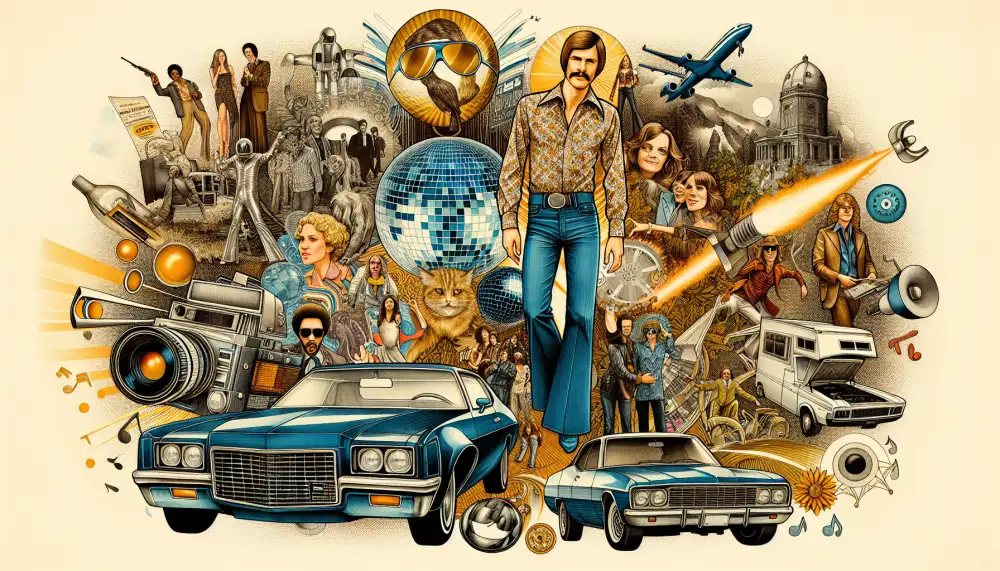
The film's brilliance lies in its simplicity. A giant shark terrorizes a small island town, and the story revolves around three men with vastly different approaches to stopping it. Roy Scheider's Police Chief Brody represents the everyman, grappling with fear and responsibility. Robert Shaw's Quint is the grizzled shark hunter, a captivating force of nature. Richard Dreyfuss as Hooper embodies science and intellect, providing a counterpoint to Quint's instinctual approach.
Jaws is a masterclass in suspense. Spielberg famously used the less-is-more approach, relying on suggestion and atmosphere to create dread. The shark itself, plagued by mechanical difficulties during filming, became a metaphor for unseen terror, making its eventual appearances all the more impactful.
Its influence on cinema is undeniable. Jaws ushered in the era of the summer blockbuster, proving that genre films could captivate audiences and dominate the box office. It also solidified Spielberg's status as a visionary director, capable of blending spectacle with emotional depth. Even decades later, Jaws remains a benchmark in filmmaking, a timeless classic that continues to thrill and terrify audiences worldwide.
Star Wars (1977)
The 1970s was a period of immense creative flourishing in Hollywood, giving rise to a new generation of filmmakers and a string of iconic movies. It was the decade of gritty realism, bold experimentation, and the birth of the blockbuster. One film, however, rose above the rest to become a genuine phenomenon: Star Wars (1977), later subtitled 'A New Hope'. This space opera, conceived by George Lucas, transported audiences to a galaxy far, far away, captivating them with its epic story of good versus evil, groundbreaking special effects, and unforgettable characters.
Star Wars stood out in a decade already rich with cinematic masterpieces. Films like The Godfather (1972) and its sequel The Godfather Part II (1974) redefined the gangster genre with their operatic scope and unflinching look at power. Francis Ford Coppola's Apocalypse Now (1979) offered a surreal and nightmarish journey into the heart of the Vietnam War. William Friedkin's The Exorcist (1973) terrified audiences and pushed the boundaries of horror. These films, along with others like Chinatown (1974), One Flew Over the Cuckoo's Nest (1975), and Jaws (1975), showcased the diversity and depth of 1970s cinema.
Yet, Star Wars held a unique appeal. It was a film that spoke to the child in every viewer, reigniting a sense of wonder and adventure. Its themes of hope, rebellion, and the battle against tyranny resonated deeply with audiences, solidifying its place not just as a great film of the 1970s, but as a timeless classic that continues to inspire and entertain generations of moviegoers.
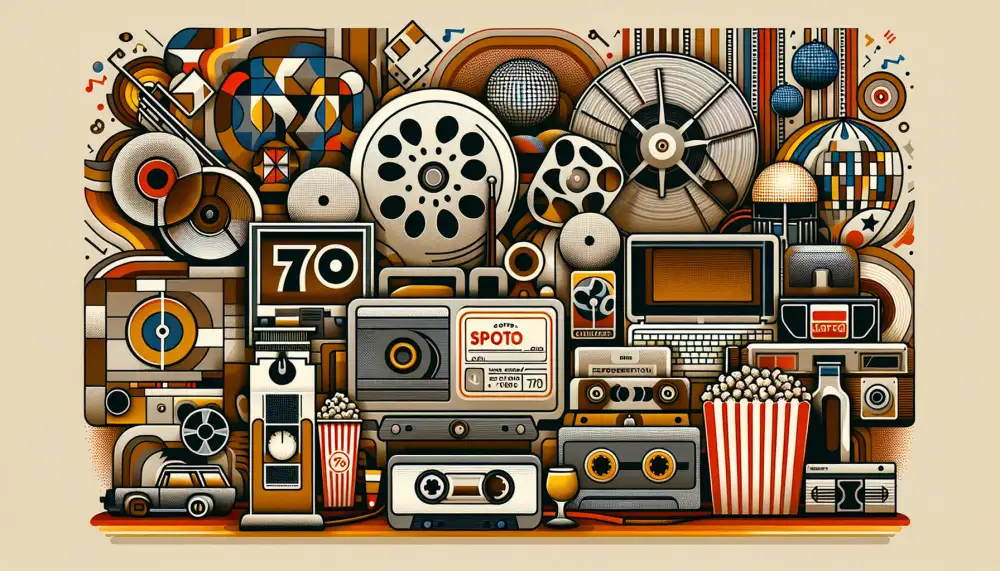
Alien (1979)
The 1970s marked a turning point in cinema, giving rise to groundbreaking special effects, gritty realism, and thought-provoking narratives. Amidst this cinematic revolution, Ridley Scott’s “Alien” (1979) emerged as a masterpiece of science fiction horror.
“Alien” transcended genre conventions, delivering a chilling exploration of isolation, paranoia, and the primal fear of the unknown. The film's brilliance lay in its masterful suspense-building, iconic creature design by H.R. Giger, and a breakout performance by Sigourney Weaver as the resourceful Ripley.
“Alien” wasn't just a monster movie; it was a masterclass in atmosphere and tension. The stark, industrial setting of the spaceship Nostromo, the palpable sense of claustrophobia, and the haunting score by Jerry Goldsmith all contributed to an unforgettable cinematic experience.
The film's impact on popular culture is undeniable. The Xenomorph, with its biomechanical design and terrifying life cycle, became one of cinema's most iconic monsters. Ripley, a strong and capable female protagonist, shattered gender stereotypes and inspired generations of filmmakers and audiences alike.
“Alien” remains a benchmark in science fiction and horror cinema. Its influence can be seen in countless films that followed, cementing its legacy as one of the best movies from the 1970s.
Taxi Driver (1976)
Martin Scorsese's neo-noir masterpiece, Taxi Driver (1976), stands as a chilling portrait of urban alienation and the psychological descent of a Vietnam War veteran. Released at the height of New Hollywood, the film's gritty realism and unflinching violence shocked audiences and cemented its place as one of the most important films of the 1970s. Robert De Niro delivers a career-defining performance as Travis Bickle, a lonely insomniac taxi driver navigating the sleazy underbelly of 1970s New York City. Jodie Foster, in a controversial role, plays Iris, a 12-year-old runaway who becomes the object of Travis's misguided attempt at redemption.
The film's brilliance lies in its ability to evoke a palpable sense of unease and dread, immersing viewers in Travis's increasingly disturbed psyche. Bernard Herrmann's haunting score, Paul Schrader's stark screenplay, and Michael Chapman's evocative cinematography all contribute to the film's nightmarish atmosphere. Taxi Driver sparked controversy upon its release for its graphic violence and disturbing themes, but it also garnered critical acclaim, winning the Palme d'Or at the 1976 Cannes Film Festival. Its influence on subsequent films is undeniable, solidifying its legacy as not only one of the best films of the 1970s but also one of the greatest films ever made.
Apocalypse Now (1979)
Francis Ford Coppola's epic war film, Apocalypse Now, wasn't just another Vietnam War movie. Released in 1979, it transcended the genre, becoming a cinematic meditation on the madness and morality of war. The film follows Captain Willard, played by a steely-eyed Martin Sheen, on a harrowing mission to assassinate the rogue Colonel Kurtz, portrayed with chilling intensity by Marlon Brando.
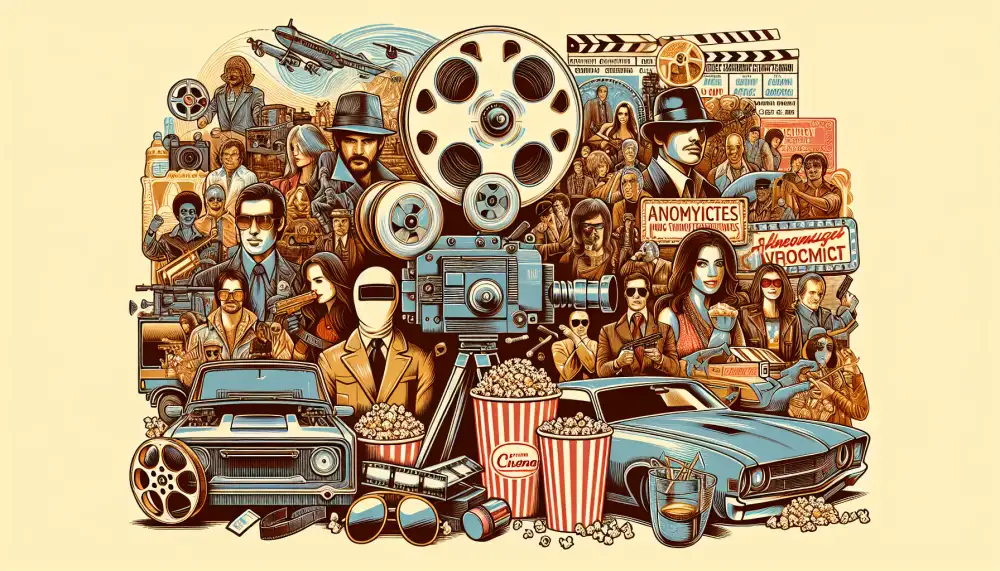
The journey upriver into the heart of darkness is as much a physical one as a psychological descent. Coppola masterfully uses sound and imagery to immerse the viewer in the chaos and surreality of the Vietnam War. The jarring helicopter attacks set to Wagner's "Ride of the Valkyries," the haunting beauty of the Vietnamese landscape juxtaposed with the brutality of war, all contribute to an unforgettable cinematic experience.
Apocalypse Now wasn't just visually stunning; it boasted a stellar cast, including Robert Duvall as the eccentric Lieutenant Colonel Kilgore, and a young Harrison Ford in a brief but memorable role. The film's themes of the dehumanizing nature of war, the loss of innocence, and the search for meaning in a chaotic world continue to resonate with audiences today, solidifying its place as one of the most important and influential films of the 1970s.
One Flew Over Cuckoo's Nest (1975)
“One Flew Over the Cuckoo’s Nest” wasn’t just a movie; it was a cultural earthquake. Released in 1975, this adaptation of Ken Kesey’s novel, directed by Miloš Forman, became a cinematic touchstone of the 1970s. Jack Nicholson, in his iconic role as Randle McMurphy, embodied the rebellious spirit of the decade, challenging the oppressive Nurse Ratched (played chillingly by Louise Fletcher) and the stifling conformity of the mental institution.
The film’s impact was immediate and lasting. It swept the Academy Awards, winning all five major categories: Best Picture, Best Director, Best Actor, Best Actress, and Best Adapted Screenplay, a feat rarely repeated in Oscar history. But its influence extended far beyond awards. “One Flew Over the Cuckoo’s Nest” sparked conversations about mental health treatment, the abuse of power, and the importance of individual freedom.
It resonated with audiences disillusioned by the Vietnam War and the Watergate scandal, offering a powerful message of hope and rebellion. The film’s raw energy, unforgettable characters, and unflinching portrayal of institutionalization cemented its place as not only one of the best movies of the 1970s but also as a timeless classic that continues to resonate with audiences today.
Rocky (1976)
Few films capture the gritty spirit of the 1970s like "Rocky". Released in 1976, this underdog story resonated with audiences hungry for inspiration. Sylvester Stallone, a then-unknown actor, wrote and starred in the film, pouring his heart and soul into the character of Rocky Balboa. This Philadelphia palooka gets a once-in-a-lifetime shot at the heavyweight championship against the formidable Apollo Creed. The film is raw, emotional, and ultimately triumphant, showcasing the power of perseverance and the pursuit of the American dream. "Rocky" wasn't just a box office smash, it became a cultural phenomenon, spawning a franchise that continues to this day. Its iconic score, training montages, and unforgettable characters have cemented its place as one of the greatest sports films ever made and a shining example of the cinematic excellence found in the 1970s.
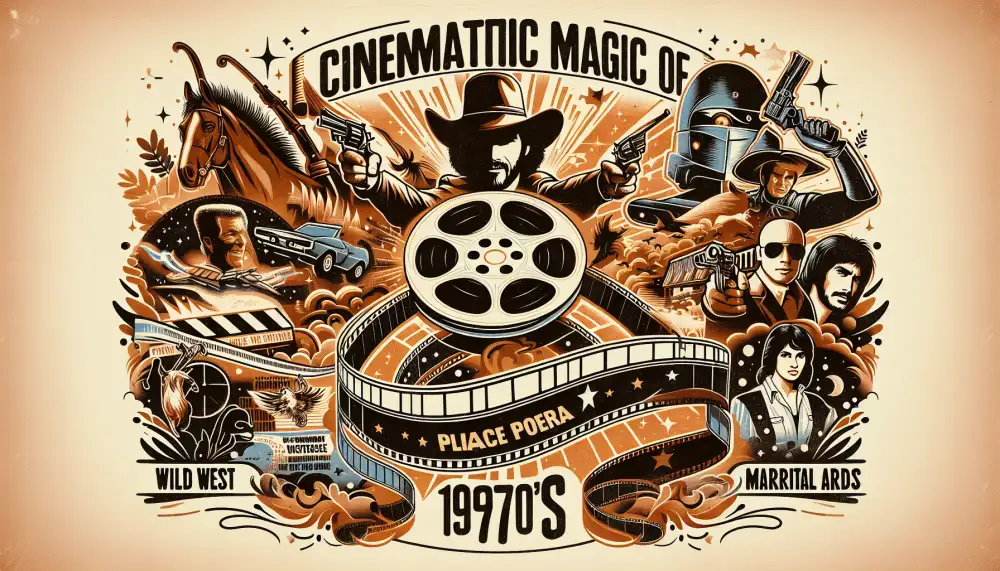
Dirty Harry (1971)
Few films capture the gritty, morally ambiguous spirit of the 1970s like "Dirty Harry." Released in 1971, the film introduced the world to Clint Eastwood's iconic portrayal of San Francisco Police Department Inspector "Dirty" Harry Callahan, a cop with little regard for rules and a penchant for using excessive force. The film was a massive box office success, becoming a cultural phenomenon and solidifying Eastwood's status as a cinematic tough guy. Beyond its commercial success, "Dirty Harry" sparked intense debates about police brutality, vigilantism, and the very nature of justice.
The 1970s were a time of social upheaval and change, and that was reflected in the movies. They were raw, they were real, and they weren't afraid to challenge the status quo.
Clementine Baldwin
The 1970s marked a golden age for cinema, a decade where experimentation and creative freedom flourished. From the gritty realism of "Taxi Driver" and "The Godfather" to the groundbreaking special effects of "Star Wars" and "Jaws," the best 70s movies left an indelible mark on cinematic history. These films didn't shy away from tackling complex social and political issues, reflecting the changing landscape of the decade. They gave us iconic characters, unforgettable dialogue, and innovative storytelling techniques that continue to inspire filmmakers today. Whether it's the raw power of "Apocalypse Now," the chilling suspense of "The Exorcist," or the heartwarming charm of "Annie Hall," the best movies from the 1970s offer a captivating glimpse into a transformative era. They remind us of the power of film to entertain, challenge, and stay with us long after the credits roll. Their influence can still be felt in contemporary cinema, proving that the legacy of the 70s lives on.
Published: 30. 06. 2024
Category: Food

